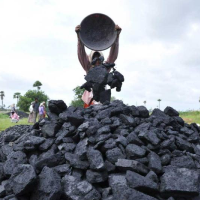Supreme Court Declares 1993-2010 Coal Allocations ‘Illegal’
 A worker dumps coal for transportation (file photo: AFP)
A worker dumps coal for transportation (file photo: AFP)
In a landmark verdict, the Supreme Court has declared illegal all coal blocks allocated between 1993 and 2010, ruling that this was done in an unfair, arbitrary and non-transparent manner without following any objective criteria.
“Allocation of coal blocks done under screening committee route and government dispensation suffers from illegality,” the apex court said on Monday. “The approach had been ad hoc and casual.”
The three-judge bench headed by Chief Justice RM Lodha said further hearing was required to determine whether there is a need for cancelling the 218 coal block allocations. It fixed September 1 for this hearing.
The order came on petitions filed by an NGO, Common Cause, and a lawyer, ML Sharma, seeking cancellation of the coal block allocations over allegations of corruption and favouritism.
These petitions were based on the Comptroller and Auditor General’s 2012 report that the country had suffered a loss of Rs. 1,64,000 crore ($210 billion) because coalfield rights were sold off cheaply instead of being auctioned. This scandal was dubbed ‘Coalgate’ by the Indian media.
Most of the illegal coal block allocations were made by the previous UPA administration. Between 2004 to March 2010 coal blocks were handed out for a nominal cost to private companies who promised to use the coal for their own power, steel and cement projects. Mining in several of the allotted fields has been held up due to bureaucratic wrangles and environmental regulations.
Opposition politicians accused the then Manmohan Singh government of "looting the country" by handing out coalfields to companies without competitive bidding. Singh came under direct pressure because he had headed the coal ministry for some years during this period.
But, according to the BBC, the Supreme Court ruling has implications for all of India's main political parties that governed between 1993 and 2010, including the NDA administration of 1998-2004.
India is the third largest producer of coal in the world and more than half of its commercial energy needs are met by coal. Its coal-rich regions include the eastern states of Orissa, Jharkhand and Chhattisgarh, where large areas containing coal are divided into blocks and leased to mining companies.
According to media reports, mining has become a source of massive corruption after India opened up mining to private companies without strong and independent regulation.
With the Supreme Court yet to decide whether these licenses should be cancelled, the uncertainty over coal contracts will add to investors' confusion about doing business in Asia’s third-largest economy.
To Learn More:
India Supreme Court declares coal licences illegal (BBC News)
'All Coal Licenses Issued Since 1993 are Illegal': Read Full Supreme Court Judgement Here (NDTV)
Chronology of coal block scam (Press Trust of India)
- Top Stories
- Controversies
- Where is the Money Going?
- India and the World
- Appointments and Resignations
- Unusual News
- Latest News
- India College Chain’s Expansion into U.S. Draws Opposition from Massachusetts Officials over Quality of Education
- Milk Shortages in India Tied to Release of New Movies Featuring Nation’s Favorite Stars
- Confusion Swirls around Kashmir Newspaper Ban in Wake of Violent Street Protests
- Polio-Free for 5 Years, India Launches Vaccine Drive after Polio Strain Discovery
- New Aviation Policy Could Increase Service, Lower Ticket Prices






Comments